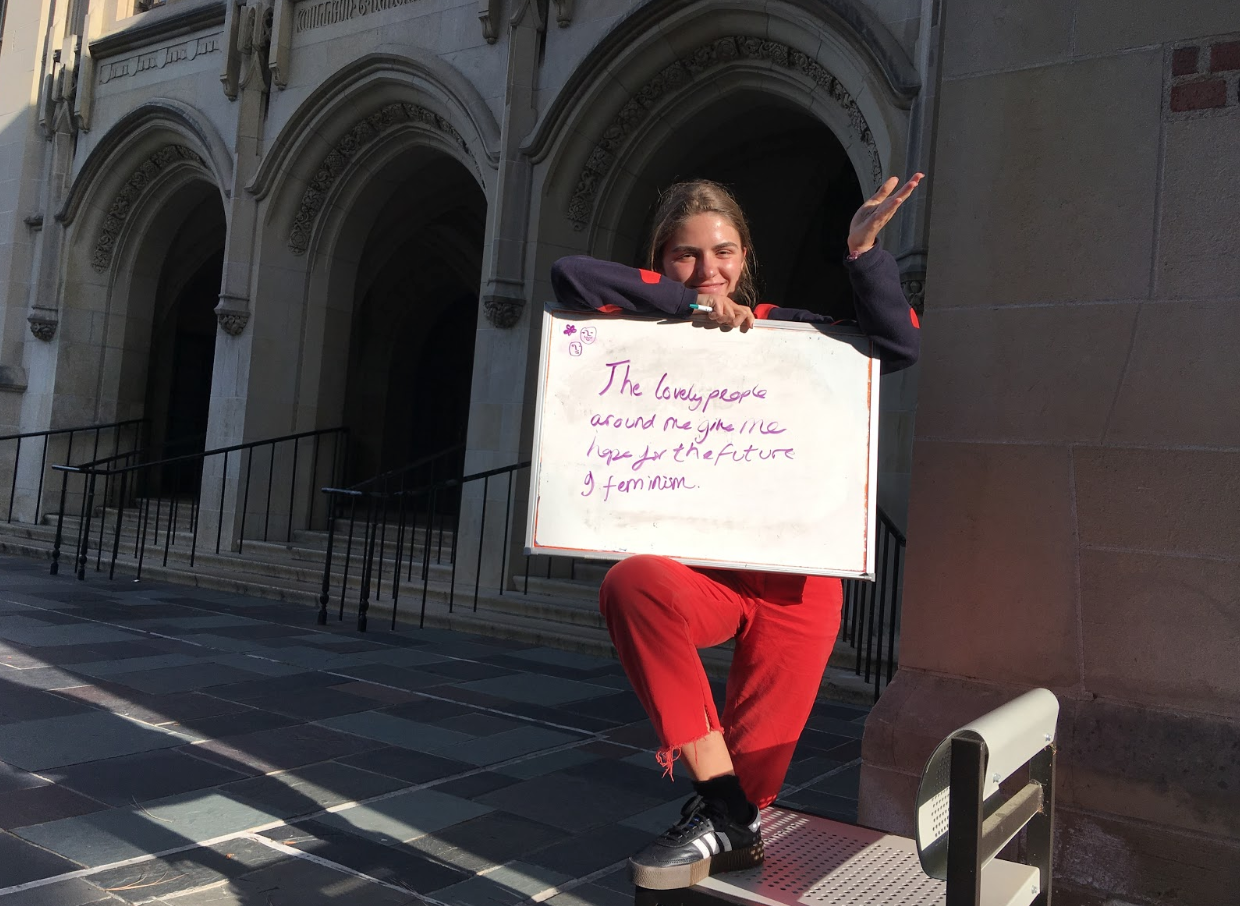Featured UCLA Feminist: Bella Barkett

Photo by Eva Szilardi-Tierney
“Feminism is almost everything.” Bella Barkett drops this succinct definition, then just as swiftly qualifies it with her musing on the conflicts of whose voice gets heard within feminism, and how, ideally, equality should come naturally. Right off the bat, Bella set the tone of our interview as a rapid fire reexamination of feminism, and asserted herself as a woman constantly questioning the status quo.
A second-year Global Studies and (hopeful) Middle Eastern studies student, Bella has already had enough worldly experience for someone twice her age. Though she hails from London (Notting Hill, to be precise), Bella’s early life found her and her family bouncing from Bahrain to Dubai to, interestingly, Dallas, Texas, before settling in England. But this settlement hasn’t stopped Bella from continuing her globally-focused life: She frequently visits family in Lebanon and Denmark, and has now turned her focus here at UCLA to supporting migrant and refugee rights.
I sat down with Bella to learn how her exposure to different cultures has influenced her views on intersectional feminism. From her winding way of speaking to her ever-layered clothing ensembles to her involvements on campus, Bella embodies the determined and multifarious nature that is arguably the quintessence of youth in the age of globalization.
Bella identifies her main feminist “realization” when she came to UCLA after attending an all-girls schools in England. “I’ve unconsciously lived in a very [feminism]-fueled and fired-up environment … I never really felt the blatant sexism that many people probably had to feel when they were growing up,” Bella explains, “We were very much taught … that you can do anything you want.” This encouragement, while critical for building self-esteem, also led Bella to develop a view of feminism which focused more on slightly generic girl-power than on developing a critical eye towards gender theory. Now at UCLA, Bella has had more opportunity to see how this type of unexamined feminism can disguise socially regressive practices, such as cultural attitudes around breastfeeding.
Bella explains that in her life she’s supported the idea that ‘breast is best’ in terms of the health of the infant, but it wasn’t until recently that she considered how the expectation to breastfeed can pressure a mother into the role of the stay-at-home caregiver and ostracize those who have difficulty breastfeeding. For Bella, this realization caused her to question what she previously considered to be a fixture within feminism, and she now finds herself more cognizant of these contradictions in general.
It is this focus on intersectionality that leads Bella into her work supporting refugees. Bella is the UCLA chapter chair of SolidariTee, a student-led movement which raises money for legal aid (and awareness) for refugees in Greece and Turkey by selling t-shirts. Here Bella’s main focus is on providing various kinds of support, “whether it be mental health support or physical legal assistance,” for refugees and to limit the amount of time spent in refugee camps.
Bella also works as part of the Global Development Lab (GDL) at UCLA, a student-led organization focused on enacting solutions to alleviate global poverty and inequality. Bella’s focus at GDL is on projects with a focus on empowering women, and her current project involves partnering with NGOs in refugee camps in order to supply women with clean facilities. Lack of access to clean facilities “is directly correlated to women[‘s enrollment] in schools … and leads to higher chance of rape … and acts of violence towards women” Bella explains, so Bella’s project hopes to supply women in these refugee camps with the supplies to create art which they could then use to decorate the facilities and effectively reclaim the space as their own.
But, true to form, Bella does not take the term “empowering women” for granted. “It’s easy to say female empowerment … but on the ground … you don’t one day wake up and feel like ‘you’re empowered’,” Bella explains. So Bella took time to consider what ‘empowerment’ would actually mean in terms of direct action, and ultimately decided upon the art-in-facilities project because it was self-actualized reclamation. Aware of the danger of engaging with white saviorism, Bella has also labored to ensure that the materials and resources for this project are in the hands of the women themselves, and has adopted a largely hands-off approach for the project.
All this engagement with international ideas of feminism and female empowerment has shaped Bella’s view of feminism to be that of a movement which engages everyone, but does so in the specific arenas of the cultural space at hand. “My conversations here with my friend versus conversations with my friends at home in London [about feminism] … are very similar, which I think is a great thing because it shows we’re all working towards the same thing,” Bella reflects, adding that the specific politics critiqued are country-specific. Simultaneously, having a cultural background which draws from so many different places, Bella finds herself more actively engaged in transnational feminist issues, such as France’s controversial burqa ban.
In many ways, it is this openness to listening and revising her opinions of feminism that makes Bella’s own relationship to the movement so reflective of the age of globalization. Throughout the course of our conversation, Bella consistently questioned her own definitions of feminism, and was unafraid to correct herself in order to be more inclusive. In a time where blunt certainty can sometimes seem to dominate (twitter comes to mind), perhaps Bella’s definition of feminism as “the ability to express yourself regardless of your gender” is simply the type of fluidity most needed.




